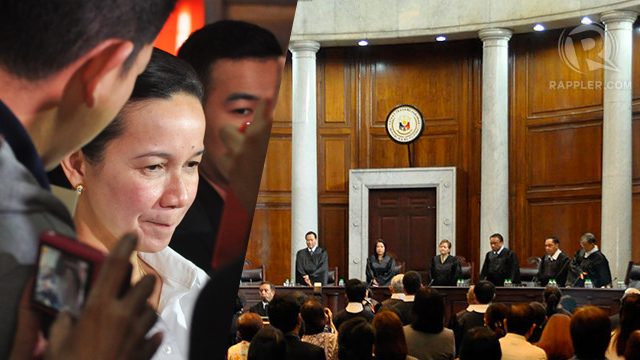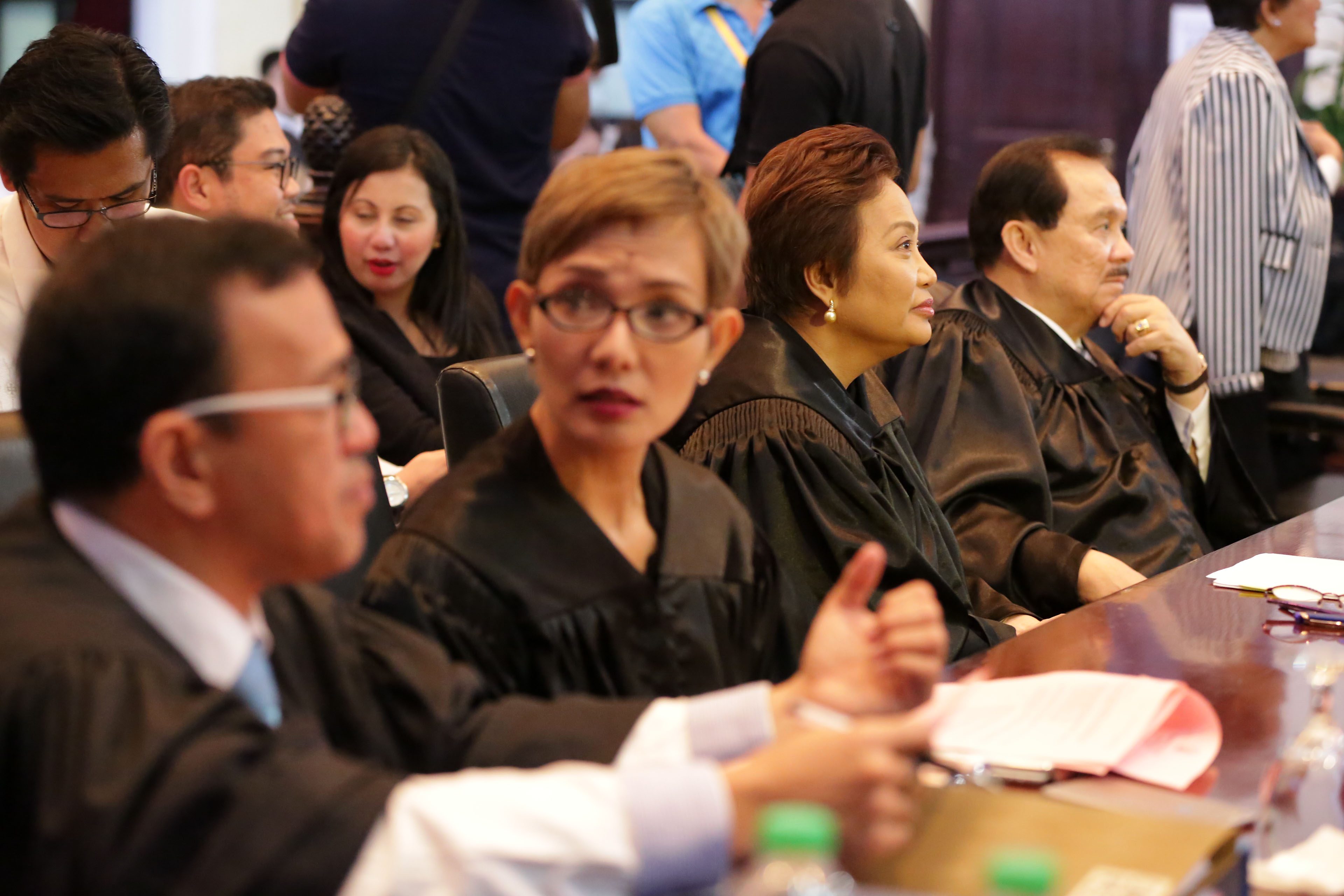SUMMARY
This is AI generated summarization, which may have errors. For context, always refer to the full article.

MANILA, Philippines – The Supreme Court (SC) is set to decide soon on the disqualification case against presidential candidate Grace Poe.
All parties to the case have already filed their memorandums days after the February 16 oral arguments.:
- Petitioner Poe, who is seeking a reversal of the poll body’s decisions to cancel her candidacy
- Respondent Commission on Elections (Comelec)
- Respondent lawyer Estrella Elamparo
- Respondent former Senator Francisco Tatad
- Respondent De La Salle University professor Antonio Contreras
- Respondent former University of the East Law Dean Amado Valdez
- Solicitor General Florin Hilbay, who refused to defend the Comelec before the SC, also filed his memorandum as “tribune of the people.”
In December 2015, the Comelec en banc decided to cancel Poe’s certificate of candidacy (COC) on the grounds that she misrepresented her citizenship and residency. The SC has temporarily stopped the poll body from implementing the decision after Poe filed petitions for certiorari.
With the oral arguments over, the High Court is expected to issue its decision in March at the earliest. What did Poe, Hilbay, and the respondents say in their memorandum?
Grace Poe
In a 331-page memorandum, Poe, through her lawyers, accused the Comelec of “clear bias and partiality” when it cancelled her COC.
She slammed the poll body for expecting her to produce a DNA evidence in order to prove she is a natural-born Filipino. By doing so, Comelec “imposed…a standard of evidence (evidence of certainty) never before seen or heard in proceedings…when the applicable standard is only substantial evidence.”
Poe said Comelec denied the senator her right to due process when it disregarded “overwhelming evidence” that Poe is a natural-born Filipino and a resident of the Philippines since May 24, 2005.
She insisted that the burden to prove her citizenship rests on her accusers – consistent with the majority opinion in the Tecson case involving her adoptive father, Fernando Poe Jr, who ran for president in the 2004 elections.
Poe, however, lamented that the Comelec First Division still followed the dissenting opinion in that case – that of SC justice Antonio Carpio’s. The justice said then that the burden of proof should be on the one whose citizenship is being questioned.
Solicitor General Florin Hilbay
At the SC, Hilbay sided with Poe, as he did when he defended the final ruling of the Senate Electoral Tribunal in a separate disqualification case filed against the senator. The SET ruled that Poe is a natural-born Filipino and had met the minimum residency requirement for national elected officials.
In his memorandum, the solicitor general said:
- Poe is a natural-born citizen under the 1935,1973, and 1987 Constitutions.
- Registration of foundlings is a purely administrative procedure, not an act required to acquire or perfect citizenship.
- There is substantial evidence that Poe is a natural-born citizen of the Philippines.
- Foundlings are a discrete and insular minority entitled to exercise fundamental political rights.
- Poe reacquired her natural-born Philippine citizenship when she availed of repatriation under Republic Act 9225.
- Poe validly renounced her US citizenship.
- Poe is a resident of the Philippines for at least 10 years immediately preceding the May 2016 elections.
It is still unclear how much weight will be given to Hilbay’s submissions, since he was not representing any of the parties in the SC case. Comelec Commissioner Arthur Lim earlier told Rappler that Hilbay could be considered an amicus curiae, a friend of the court.

Commission on Elections
Comelec, through its lead counsel Commissioner Lim, again denied in its 85-page memorandum that it acted with grave abuse of discretion in cancelling Poe’s COC for the 2016 elections on the ground of material misrepresentation.
The poll body said it did not usurp the jurisdiction of the Presidential Electoral Tribunal when it ruled on Poe’s eligibility to run for president.
It also insisted that the earlier SET decision favoring Poe does not prevent Comelec from determining Poe’s citizenship.
The Comelec believes the senator is bound by the entry in her 2012 COC, where she declared she had been a resident in the Philippines for 6 years and 6 months. This means she lacks a few months to meet the 10-year residency requirement for presidential candidates in 2016.
Estrella Elamparo
Elamparo filed an 84-page memorandum, where she discussed the legal issues regarding Poe’s material misrepresentation.
“Apart from [that], I tried to address the non-legal or policy concerns and possible dire consequences of a judgment in her favor,” the lawyer told Rappler in a text message Tuesday, February 23.
In her prefatory statement, she argued that while the consequences of ruling against Poe have “potentially deleterious consequences” as emphasized by “some members” of the SC, “nothing can be more deleterious and shameful than perverting the Constitution to allow one who is not natural-born, of flip-flopping allegiance, has established domicile elsewhere, and has repeatedly misrepresented under oath her status and residency, to run for the highest post in the land.”
Elamparo said she argued lengthily against judicial legislation in her memorandum, and argued also that social justice and equal protection of law are not valid reasons to rule in Poe’s favor.
Francisco Tatad
Manuelito Luna, counsel for petitioner Tatad, told Rappler on Tuesday that the following are the highlights of their memorandum:
- Bloodline is the only basis for determining and recognizing birthright citizenship.
- Poe cannot lay claim to Philippine citizenship having unknown parentage.
- Citizenship provisions are nationalist in character, and, thus, cannot be relaxed to favor Poe.
- Due process and equal protection have not been implicated since Comelec’s judgments were based on the evidence as well as legal and jurisprudential norms.
- Inasmuch as the provision of Article IV, Section 1 of the 1935 Constitution is clear and unambiguous, the SC cannot resort to interpretation, much less construction. Its duty under the circumstance is to apply the provision.
- The textual approach of interpretation is the safer approach. The SC cannot rewrite the Constitution in guise of protecting foundlings.
Antonio Contreras
Contreras, meanwhile, told Rappler that his memorandum:
- Debunked the points raised by SC justice Francis Jardeleza on equal protection and due process
- Assailed the solicitor general’s use of statistics
- Affirmed the point that the Coquilla case remains valid as a precedent to answer Chief Justice Maria Lourdes Sereno
- Affirmed that the Balikbayan law will not help Poe
The professor said that in the issue of residency, Poe had an intent to mislead or deceive because of two points: her inconsistency not only in her claims but also in her acts when measured vis-a-vis her stature and academic preparation, and her other actions that reveal a pattern of committing false representation of official documents.
Amado Valdez
In his memorandum, Valdez said the danger created by dual allegiance under Republic Act 9225 or the Citizenship Retention and Reacquisition Act of 2003 “militates against [Poe’s] acquisition of natural-born status.”
He reiterated that there is no clear authority under the said law to allow Poe to reacquire a natural-born status. Besides, he said, filing a petition to reacquire citizenship under RA 9225 “is a specific act inconsistent with the definition of the Constitution of a natural-born citizen.”
Valdez noted that several acts committed by Poe established “overwhelming proof” of material misrepresentation of her residency in her 2015 COC. He also believes allowing Poe to disown her 2012 COC “is a dangerous precedent.” – Rappler.com
Add a comment
How does this make you feel?
There are no comments yet. Add your comment to start the conversation.